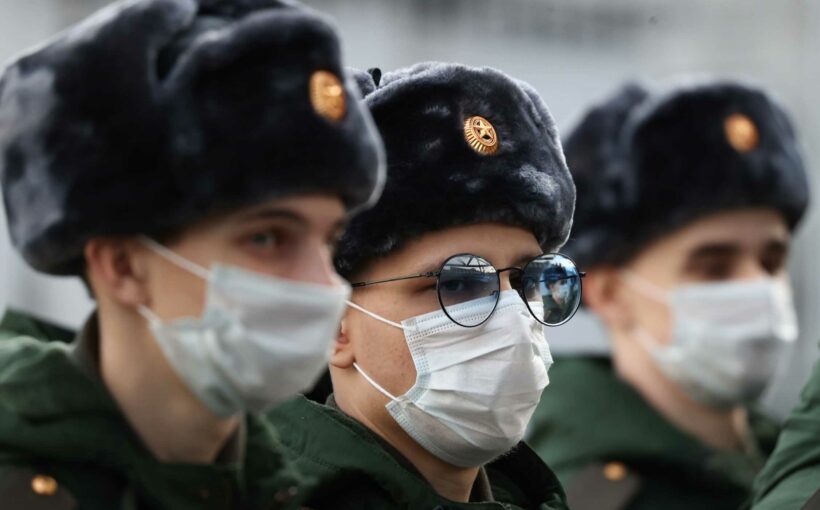- U.S. officials said earlier this month that Russia could launch a military incursion into Ukraine in early 2022, with about 175,000 troops.
- The Kremlin has denied the accusations.
- The highly sensitive issue is set to dominate talks in Brussels on Thursday as the 27 EU leaders meet.
BRUSSELS — The European Union is concerned about Russia's "aggressive" stance toward its neighbors, warning Moscow that it will pay a "high price" if it invades Ukraine.
U.S. officials said earlier this month that Russia could launch a military incursion into Ukraine in early 2022, with about 175,000 troops. The Kremlin has previously denied the accusations and the Russian government was not immediately available for comment when contacted by CNBC Wednesday.
The highly sensitive issue is set to dominate talks in Brussels on Thursday as the 27 EU leaders meet.
"At this point in time, Russia is choosing an aggressive posture vis-à-vis its neighbors. And as the European Union and its G-7 partners have made very clear, further aggressive acts against Ukraine will have massive costs for Russia," European Commission President Ursula von der Leyen said Wednesday.
The message was echoed by the new German chancellor, Olaf Scholz, in Berlin.
When addressing Germany's Parliament Wednesday, Scholz warned of a "high price" for Russia if it chooses to invade Ukraine. Scholz also spoke of an openness to "constructive dialogue" with Russia, according to reports from Politico.
'Always worried about our big neighbor'
Back in Brussels, EU officials indicated that there wasn't much room for talks with Moscow. An EU diplomat, who did not want to be named due to the sensitive nature of the talks, told CNBC Wednesday that dialogue with the Kremlin "would only happen if the Ukraine issue was not on the table."
This suggests that for talks between the EU and Russia to take place, there would need to be a significant de-escalation of tensions on the Ukrainian border.
Other officials went a step further.
Estonia Prime Minister Kaja Kallas told CNBC that the only way to see a EU-Russia summit again would be if the Kremlin gives Crimea back to Ukraine. The Black Sea peninsula was annexed by Russia back in 2014, defying Western leaders at the time.
"If we are stepping towards Russia in this regard, and forgetting all the things that we said in 2014, then we are weak because we are stepping away from what we said," Kallas told CNBC.
Kallas admitted that her country, a NATO member and one of many European nations that borders Russia, is "always worried about our big neighbor."
"We clearly see Crimea, we see Donbass [in Ukraine], we see also Georgia, they have made the steps that are hurting different countries, and therefore we should all be worried," she said.
On Thursday, European leaders are expected to state they are united on this matter and will stand behind Ukraine's sovereignty.
How could the EU react?
The main question is how far is the EU is willing to go. Critics say that the ongoing EU sanctions against Russia, implemented in the wake of the 2014 annexation, do not hurt the regime of President Vladimir Putin enough.
But speaking to CNBC, Kallas defended the European approach.
"We have intelligence that the sanctions actually hurt. Russia has lost 2% of its GDP over the years due to the sanctions. And of course, Europe needs to have strategic patience," she said, adding that economic penalties take awhile to have an impact.
Ultimately, this might be the path that the EU decides to take.
"Our response to any further aggression may take the form of a robust scaling-up and expansion of these existing sanctions," von der Leyen said Wednesday.
She added the bloc could go even further. "We are ready to take additional, unprecedented measures with serious consequences for Russia," she said.
Many issues with Russia
There are, however, other Russian actions that have raised concerns among EU leaders and officials. In October, Moldova's Prime Minister Natalia Gavrilita told Reuters that Russian energy giant Gazprom was not offering a traditional annual rollover of a previous, 30-year gas contract, instead offering a three-fold price increase. Russia denied the claims.
Von der Leyen on Wednesday accused Russia of a "blatant attempt to intimidate Moldova's reformist government" by squeezing their gas supplies at a time when energy prices are high. She added that "we must protect our societies and our democracies from this kind of cynical geopolitical play."
Meanwhile, EU leaders also see a link between tensions at the Belarus-Poland border with this wider instability.
"The situation at our border with Belarus should be seen in a wider context, mainly the deliberate attempt to destabilize the security of our democracies and those of our neighbors," von der Leyen said Wednesday.
Source: Read Full Article
